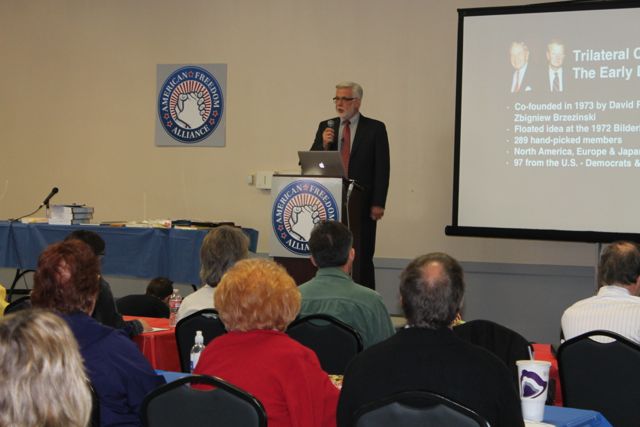I’m observing a conference in Los Angeles today organized by the American Freedom Alliance and Freedom Advocate entitled The Globalization of California: Will an Unelected, Unaccountable Bureaucracy Soon Be Running Our Lives?. It is well-attended and well-organized, as American Freedom Alliance’s events seem to be, with over one hundred filling the seats to hear about the latest challenges to individual freedom in California.
The opening lecture by Patrick Wood warned of “the prospect of a scientific dictatorship,” and a “technocracy” run by the Trilateral Commission. I’d heard it all before–the warnings about alliances of bankers and world leaders working together to lower trade barriers and carry out self-serving agendas for the benefit of a global elite. These are the supposed global masters working through our federal and state governments to oppress us.
The next talk, by Debbi Bacigalupi, was about Agenda 21 and the threat of “sustainable development.” Genuine concerns about environmental regulations meshed with overheated suspicion of anything associated with the UN. The meaningless, feelgood jargon of environmental activism routinely bandied about by tree-hugging do-gooders was revealed to be a sophisticated plan to replace the U.S. Constitution and the Ten Commandments.
At the core of this alarmism are real concerns. California is run by leftists who are devoted to redistributionist schemes that often use environmentalism as a moral cloak. Likewise the federal government, whose agencies are dominated by interventionist bureaucrats whose efforts are only slowed, not stopped, by the periodic GOP presidency. International institutions, often staffed by well-fed socialists, eagerly amplify the utopian chorus.
Yet a common font of bad ideas does not a conspiracy make. Occasionally, there is actual coordination among ideologues at different levels of government, and internationally. More often, there is not–just a herd mentality among academics, administrators and activists pursuing the latest left-wing fad. The twin impulses of economic leveling and political control seem to be ubiquitous features of human society, and need no formal insitgation.
The conference packet includes an article warning about “regionalism”–a very real strategy pursued by the hard left, and by Barack Obama in his community organizing days, to redistribute wealth from the suburbs back to the mismanaged Democrat-run cities. (Stanley Kurtz has documented how San Francisco has become the model for a national effort.) Yet the article labors to connect regionalism to a UN-mandated “shadow government.”
Also included is a map of the continental United States, crisscrossed with biodiversity corridors mandating “little to no human use,” the idea being that participation in international environmental conservation efforts is actually a ploy to control the lives of ordinary Americans. No doubt, that desire to control is endemic among some environmentalists, but in practice, it is held in check by competing ideas and interests, as well as reality.
In talking to some of the attendees, I am struck by the desire they have to find a way to communicate their real-world, concrete concerns about eminent domain abuse, overregulation and taxation into terms that would make the rest of the political world take notice. The victims of California’s innumerable far-left ideological projects, from high-speed rail to cap-and-trade, are real people, suffering alone, largely ignored by the media.
Such is the weakness of the conservative opposition in California that some disgruntled residents are tempted to forego ordinary political activism to embrace a counter-utopia: a millenarian vision in which the only option is to provoke confrontation with the coordinated global villains allegedly running our lives. Sadly, these are reasonable people, with reasonable concerns, pursuing an unreasonable theory whose failure is self-fulfilling.
Promoting freedom ultimately means promoting self-government. That is an increasingly difficult challenge in a one-party state like California, which not only fails to listen to some of its most productive citizens but adds to the alienation many already feel from Washington. Yet the answer to that challenge cannot be simply to encourage that sense of alienation and alarm, but to provide people with effective ideas for civic responses.

COMMENTS
Please let us know if you're having issues with commenting.